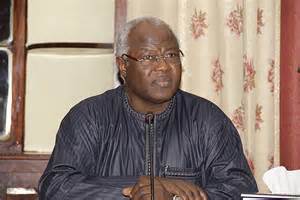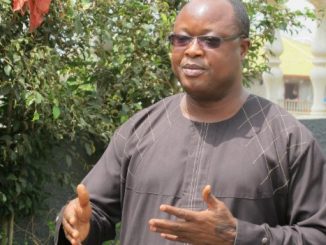
Government has made significant progress in the implementation of the AGENDA for CHANGE during 2008 to 2010. The programmes and projects implemented under each of the strategic priorities of the AGENDA for CHANGE are detailed below:
Energy
Government recognised that access to reliable and affordable energy supply on a sustainable basis promotes economic development and has therefore prioritized the improvement of electricity supply throughout the country.
The Bumbuna Hydroelectric Dam was completed and commissioned in late 2009 and this has improved the supply of electricity in Freetown. With assistance from the Japanse International Cooperation (JICA), a 10MW thermal plant was also installed at the Kingtom Power Station in 2010 to augment electricity supply to the Western Area. With Support from the Arab bank for Economic Development in Africa (BADEA), two thermal plants of 8.25 MW at the Black hall Road Power station to supplement power from Bumbuna especially during the dry season. In the provinces, the Bo-Kenema thermal plants are being overhauled while the Dodo Hydro dam is expanded to increase the supply of electricity.
However, the adequacy and reliability of electricity supply continues to be hampered by a fragile Transmission and Distribution (T&D) network which is over 40 years old. To improve on the T&D network, Government has provided substantial funds to replace the old network. The installation of 33kV lines in Freetown and the Western Area and is expected to increase the transport capacity of the T&D network from the current 30MW to about 45MW by the end of 2011. Government is also pursuing programmes to increase the supply of electricity in the rural areas through the use of solar technology. To this end, Government piloted a Solar Electrification Programme with support from the BarefootCollege in India.
Roads
The important role of a good road network in supporting other economic activities as well as the delivery of basic services cannot be over-emphasized. In this regard, Government embarked on a major road construction programme to link different parts of the country and facilitate the movement of people and goods. The construction/reconstruction of major highways (e.g. Masiaka-Bo, Bo-Kenema, and Makeni-Matotoka Highway) have been completed, and the construction of the Rogberay-Pamlap Highway and other roads (Tokeh- Lumley, the Hill-Side Bye Pass Road, widening of the Wilkinson Road and the rehabilitation of streets in Freetown and the provincial headquarter towns) are in progress. In addition, about 555km of feeder roads were completed in 2010 and work on other feeder roads are nearing completion.
Agriculture
To promote agricultural development, Government developed a National Sustainable Agriculture Development Plan (NSADP, 2010-2030) within the framework of the Comprehensive Africa Agriculture Development Programme (CAADP) in 2009. With support from development partners, Government introduced the Smallholder Commercialisation Scheme (SCS) within the framework of the NSADP to ensure the effective provision of services to all farmers nation-wide. As most of the poor are farmers, mainly engaged in small farming operations, it was critical that Government singled out this programme within the agricultural sector. The SCS has brought together 10,000 farmers, who were provided with packages of subsidised inputs, machinery and training. Also, 150 Agricultural Business Centres (ABCs) are being constructed across the country. An agricultural machinery and equipment hire purchase scheme was launched in 2010 to promote agricultural commercialization through mechanization. The 265 tractors and other agricultural machinery were acquired under a Line of Credit from the Government of India. These tractors have been deployed throughout the country.
Education
Government realised the importance of increasing attendance in schools but further recognises the importance of retaining these students in the long run. As a result, government formulated the National School Feeding Programme to supplement the WFP School Feeding Programme already in existence with the aim to increase attendance rate, retention and minimise child stunting which is very endemic in Sierra Leone. Government, with assistance from development partners provided in-service training for teachers as well as developing a code of conduct for teachers to improve ethical standards in the educational system. Government through the SABABU project supplied 1,000,000 sets of textbooks to primary schools and 100,000 to secondary schools. An Educational Management Information System (EMIS) has also been installed in the MEST.
Health
Government’s health policy objective was to improve the health of the population, especially mothers and children, through strengthening national health systems. A key priority on the Government’s development agenda for 2010 was the implementation of the Free Healthcare Initiative. To ensure this, Government provided additional resources towards improving the conditions of service of medical staff, procurement of drugs and equipment, and strengthening sector supervision. Essential drugs have been provided to each district for the implementation of the Free Health Care Policy. To improve the quality of health care in health delivery facilities, Government also procured medical equipment for the 6 referral hospitals in the country.
Government also undertook a nationwide distribution of 3 million treated bed nets in December 2010 to control the spread of malaria. Furthermore, Government in its efforts to increase the number of peripheral health facilities with at least two health personnel, additional 1,000 healthcare staff were recruited.
Structural Reforms:
Public Financial Management
Government continues to implement public financial management reforms under the multi-donor funded Integrated Public Financial management Reforms project (IPFMRP), which seeks to consolidate and deepen reforms undertaken in earlier years.A comprehensive review of the National Public Procurement Act (2004) and Government Budgeting and Accountability Act(2005) and their respective supporting regulations is being undertaken. Government has adopted a comprehensive debt management law in 2011.
Efforts continue to be made to strengthen the Medium-Term Expenditure Framework (MTEF) by enhancing the planning, monitoring and evaluation process for capital projects. To this end, Government amended the GBAA (2005) in support of an appropriate framework. Going forward, Government will fully integrate three-year public investment plan with the budget process. To further strengthen the budget planning process, an IMF style Financial Programming and Policies model (the Sierra Leone Integrated Macroeconomic Model-SLIMM) has been developed. The model is now used to produce consistent and robust medium-term macro-fiscal forecasts which feed into the budget planning process.
Following the enactment of the National Public Procurement Act in 2004, significant progress has been made in improving the public procurement process. Good quality procurement plans are now prepared by MDAs and the volume and value of public procurements that go through competitive process is also increasing steadily. A cadre of procurement professionals has been established in the civil service and procurement specialist have been recruited and deployed in key MDAs.
Progress continues to be made in strengthening the internal audit function across Government. In 2010, Government recruited 51 internal audit personnel including a Deputy Director, Principal Auditors and Senior Auditors. These were deployed in key MDAs. As a result, the number of MDAs with fully functional internal audit units has been increased from 8 in 2009 to 31 in 2010. Internal audit committees have also been established and are meeting regularly to follow up on audit recommendations.
With regards to external audit, the Auditor-General’s report on 2009 Public Accounts has been laid in Parliament. The audit of the 2010 Annual Public Accounts is in progress. Government continues to implement Public Expenditure Tracking Surveys (PETS) to ascertain the proportion of disbursed public resources that reach the intended beneficiaries. The 2010 PETS covering selected 2009 and 2010 poverty-related expenditures was implemented in September 2010. A draft report on the findings was produced in May2011.
The roll-out of the Integrated Public Financial Management Information System (IFMIS) continues. The IFMIS has now been rolled out to 11 MDAs to foster commitment control and the processing of public financial transactions. Plans are at an advanced stage for the roll-out of IFMIS to additional 6 MDAs. MOFED continues to provide training and support to IFMIS users across MDAs. To improve financial management in the local councils, the PETRA Accounting package-a financial management information system has been rolled out to 8 local councils. Plans are underway to roll-out to three additional local councils.
Private Sector Development
Government recognises that the private sector constitutes the main engine for economic growth and development, noting that only about 20 percent of national businesses is in the hands of the state, the rest, though operated mostly informally, are in the hands of the private sector. Thus, within the framework of the national poverty reduction strategies, Government has been implementing reforms to improve the investment climate.
These include removing the administrative barriers to investment, strengthening and modernizing the legal and regulatory framework for business development. A private sector development strategy has been developed. A comprehensive Investment Incentives Policy was also approved in 2009. In 2010, a National Trade Policy was developed and launched, including initiating the process for the development of an industrial policy. More recently, Public–Partnership Policy (PPP) framework was put together and a draft PPP law has been enacted by Parliament and is awaiting Presidential accent.
Anti-Corruption Efforts
As part of its effort to improve governance and fight corruption, Government established the Anti-Corruption commission (ACC) following the enactment of the Anti-Corruption Act in 2000. The ACC recorded some successes during 2005-07 but was constrained by its inability to prosecute corrupt cases, without reference to the Office of the Attorney-General and Minister of Justice.
The Anti-Corruption Act 2000 was therefore repealed and replaced with the Anti-Corruption Act 2008. The new 2008 ACC Act gave prosecutorial powers to the Anti-Corruption Commission. The amendments to the 2000 Act include creating new offences such as illicit enrichment, abuse of office and misuse of office; providing adequate protection for whistleblowers and informers; making it compulsory for all public servants to declare their assets and make adequate provision for international cooperation in the fight against corruption. The amendments have ensured that the national legislation is in tandem with the United Nations Convention against Corruption (UNCAC), which Sierra Leone has ratified, and the African Union Convention on preventing and Combating Corruption, which Sierra Leone will soon ratify. Government also revised, adopted the National Anti-Corruption Strategy (2008-13). In 2010, the ACC handled 117 cases, eight (8) of which led to convictions, including two Government Ministers.
Note: Dr Samura Kamara is the Minister of Finance and Economic Development. The above article was extracted from his Letter of Development Policy dated 8 June, 2011 and addressed to Dr. Donald Keberuka, President of the African Development Bank in Tunisia.




Leave a Reply